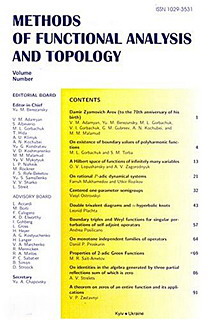S. M. Torba
Search this author in Google Scholar
Inverse theorems in the theory of approximation of vectors in a Banach space with exponential type entire vectors
MFAT 16 (2010), no. 1, 69-82
69-82
An arbitrary operator $A$ on a Banach space $X$ which is a generator of a $C_0$-group with a certain growth condition at infinity is considered. A relationship between its exponential type entire vectors and its spectral subspaces is found. Inverse theorems on the connection between the degree of smoothness of a vector $x\in X$ with respect to the operator $A$, the rate of convergence to zero of the best approximation of $x$ by exponential type entire vectors for operator $A$, and the $k$-module of continuity with respect to $A$ are established. Also, a generalization of the Bernstein-type inequality is obtained. The results allow to obtain Bernstein-type inequalities in weighted $L_p$ spaces.
Direct theorems in the theory of approximation of Banach space vectors by exponential type entire vectors
MFAT 13 (2007), no. 3, 267-278
267-278
For an arbitrary operator $A$ on a Banach space $X$ which is the generator of a $C_0$--group with certain growth condition at infinity, direct theorems on connection between the degree of smoothness of a vector $x\in X$ with respect to the operator $A$, the rate of convergence to zero of the best approximation of $x$ by exponential type entire vectors for the operator $A$, and the $k$-module of continuity are established. The results allow to obtain Jackson-type inequalities in a number of classic spaces of periodic functions and weighted $L_p$ spaces.
$p$-Adic fractional differentiation operator with point interactions
MFAT 13 (2007), no. 2, 169-180
169-180
Finite rank point perturbations of the $p$-adic fractional differentiation operator $D^{\alpha}$ are studied. The main attention is paid to the description of operator realizations (in $L_2(\mathbb{Q}_p)$) of the heuristic expression $D^{\alpha}+\sum_{i,j=1}^{n}b_{ij}\delta_{x_i}$ in a form that is maximally adapted for the preservation of physically meaningful relations to the parameters $b_{ij}$ of the singular potential.
On existence of boundary values of polyharmonic functions
MFAT 10 (2004), no. 2, 4-12
4-12

